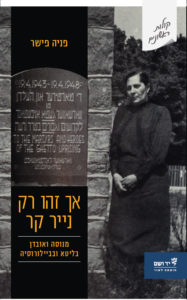Fisher, Fania. But It’s Only a Piece of Paper: Escape and Loss in Lithuania and Belarus, 2023
 Fania Fisher (née Tsaikinsky) was born around 1901 in the town of Ignalina, on what was then the border between Lithuania and Belarus. As an adult, she lived not far from there in the town of Svir with the family she had established — her husband Yehuda (Yudel) Fisher, their daughter Zlate, and their son Moshe. Fania was an educated woman and a teacher by profession.
Fania Fisher (née Tsaikinsky) was born around 1901 in the town of Ignalina, on what was then the border between Lithuania and Belarus. As an adult, she lived not far from there in the town of Svir with the family she had established — her husband Yehuda (Yudel) Fisher, their daughter Zlate, and their son Moshe. Fania was an educated woman and a teacher by profession.
With the Nazi occupation in 1941, she was identified with the former Soviet regime because of her line of work, and therefore was forced to flee, fearing that her presence might endanger her family. After a harrowing period of wandering, living under a false Russian identity, and performing exhausting labor, Fania eventually managed to escape to the forests of western Belarus and join the partisans. She served in a production unit responsible for supplying food, clothing, and other goods to the fighting partisans.
While in the forest, Fania received the devastating news that her family had been murdered in the Ponar killing site, south of Vilnius, in April 1943. From the moment she learned of this tragedy until her death, Fania never ceased to mourn her destroyed community — and above all, her daughter and son.
In 1947, while staying in a displaced persons camp in Berlin, Fania began to record her memories in writing. Her book, written in Yiddish, was typed and circulated in Israel in only a few copies among family members and fellow townspeople. The author dedicated her words of grief to commemorating the murdered. Her loss, suffering, and longing are deeply felt in her writing — which combines prose and testimonial poetry — as is her profound commitment to remembrance.

